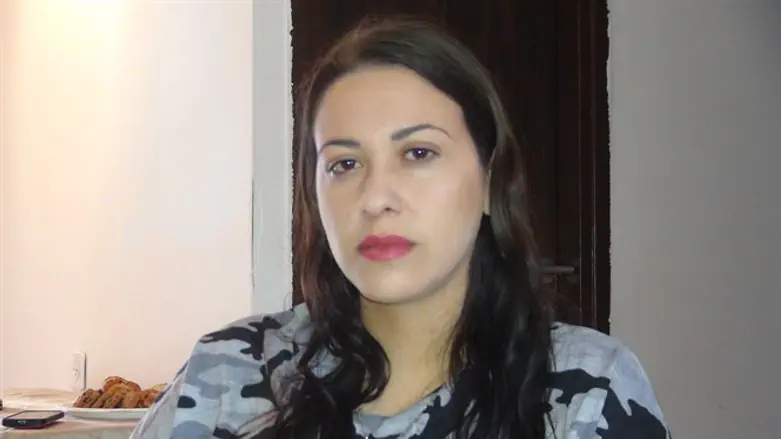
Coral Ben-Shabbat, coordinator for the anti-assimilation group Lehava, spoke with Arutz Sheva about the long and winding road she passed before joining the ranks of the organization.
“At the age of 13 I met an Arab. At first I didn’t know that he was an Arab, but even after I did know it didn’t bother me. He promised that he would convert,” Ben-Shabbat related. “I promised my parents that I was finished with him, but then I decided to run away to him. His family received me.”
At that stage, Ben-Shabbat’s family came to the Arab’s house to rescue Ben-Shabbat, but her Arab boyfriend and his family members started stabbing them with knives.
And you still continued to live with him?
“I continued to live with him for a week-and-a-half. He explained that [Ben-Shabbat’s family] had attacked him first, and I paid a lawyer to bail him out. I covered for him when he was fleeing the police. And then Lehava turned to me and convinced me, and helped me to get out of there.”
How does a Jewish girl end up going out with an Arab?
“We live together with them. Girls don’t see anything bad in it [...they] don’t see the severity of going out with an Arab, don’t see what the end of it all will be.”
When Lehava turned to you, how did you decide to go with them instead of your boyfriend?
“The Rabbi of the organization explained to me what would happen, and they opened my eyes to what I didn’t see before.
How did you separate from him?
“I told him that I wanted to leave. I set out and traveled to Eilat. After a year during which he looked for me I returned to Nahariya, and then I joined the organization.
You left your life and turned to the other side, to the Lehava organization?
“In the beginning it was hard for me when I spoke with girls and tried to convince them. I still loved him. I, myself, didn’t believe it because I still loved him, so how could I convince others? But the understanding that it was a mitzvah and I could help others - this is my significance in life.
How is your connection with your family?
“The connection is good, even though I know that they still haven’t forgiven me.”
They talk about Lehava like it’s an “extremist” organization. What would you want people to know about this organization which they don’t know?
We don’t just rescue a girl and a week later tell her to apologize. We accompany her for a year or two, until she gets married. We are not a racist group, we just don’t want Jewish girls to go out with Arabs and live with them in their villages if they can go out with Jews.
Did you ever imagine that you would one day be speaking the way you are now?
No. I was a leftist. I loved Arabs and I saw Lehava as the worst thing there is. Today, I see the organization as the best thing there is.”
What message would you like to give to girls reading this interview?
“In general, girls that I come to take out tell me, ‘My Arab is different.’ In the end, after you marry him, reality will change. He can treat you well, but the minute you are his, everything changes.
You didn’t just join the organization - you are active in it.
I speak with the girls and try to uplift them. I speak to them as a professional and uplift them, I suggest to every girl that is stuck to contact the organization and know that the door is open to everyone.”
Chairman of Lehava Bentzi Gopshtain noted, “the core of the quiet activity of Lehava is saving and rehabilitating the daughters of Israel. Coral Ben-Shabbat has merited to save dozens of girls who fell into relationships with Arabs [...] I call on anyone who knows a girl in danger of assimilation to contact Lehava. We will do whatever we can to help her.”